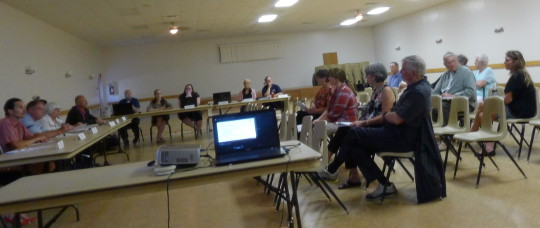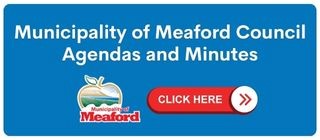Stephen Vance, Staff
A dozen residents turned out for the seventh and final public input session for the municipal service delivery review, held at the Meaford & St. Vincent Community Centre on Thursday June 2.
The municipality has sought input from residents through public input sessions as well as surveys as part of the service delivery review, and with the public input sessions complete, the initiative moves into the next phase with 66 individual presentations and reports for each municipal service area beginning with the Fire Training Centre and trails including the Georgian Trail on June 6, and ending with Organics and Recycling and Solid Waste Collection on July 24 of next year.
Though the seven public input sessions, which were held throughout the municipality have been completed, Meaford CAO Denyse Morrissey encouraged residents to complete and submit the service review survey to help the municipality gather as much public input as possible.
“The critical thing is input,” the CAO told the audience on June 2. “It’s an understanding of value for service, and do we need to be delivering the service. There’s no pre-determined outcome, however there are expectations when you undertake these types of reviews that you could find savings, or should find savings, and you will optimize the way you deliver service. How are we going to know how the community anticipates services to be delivered, wants change or doesn’t want change? That’s why we need your input.”
At the June 2 meeting residents offered their concerns and input relating to a range of issues.
One resident expressed frustration with the control of bylaws relating to dogs, and an overburdened bylaw enforcement department that with just one full time officer and a seasonal officer struggles to keep up with the large number of calls.
Meaford Treasurer, Darcy Chapman, told the audience that Meaford’s bylaw enforcement officer deals with a wide range of issues, and receives a large number of calls.
“On an annual basis, our bylaw current enforcement officer deals with give or take, 600 calls per year. To put that in perspective, we have an OPP contract that provides the equivalent of 11 officers, and they deal with about 1,700 calls per year,” noted Chapman.
Resident and former Mayor Gerald Shortt wanted to know why Meaford has so many department heads.
“I just wonder why we need so many heads of departments in our municipality. Back when I was Mayor back in 2003, we had one Clerk/Treasurer and that was it,” suggested Shortt.
Shortt also suggested that maintenance and repair of rural roads has suffered since the amalgamation of the former Town of Meaford and the townships of Sydenham and St. Vincent.
Concern was also expressed at the June 2 meeting for the state of Meaford’s library building which continues to suffer from flooding and mold, the lack of public transportation between Meaford and neighbouring communities like Owen Sound and Collingwood, the lack of family physicians in the municipality, and the difficulty experienced by seniors in search of affordable housing.
One resident also noted the lack of media at the rural public input meetings held over the past several weeks. (Editor’s note: A valid point. I can’t speak for the other media outlets, but for this paper I can say that of the seven meetings, three were held on Tuesday evenings which is our production period for our weekly print paper, and so I was unable to attend the Tuesday meetings. I was able to attend and report on the first and the last of the meetings which were held on a Monday and a Thursday respectively. Unfortunately the municipality does not need to consult with the media when setting meeting dates and times, however if the five meetings in the middle had been held on evenings other than Tuesdays, we certainly would have been there.)
With the public input sessions complete, council will now begin receiving reports and presentations for all 66 service areas in the municipal operation, a process that will take more than a year to complete.
During the review process, every service offered by the municipality will be tested with 10 questions:
-
Do we really need to continue to be in this business/service?
-
What do citizens expect of the service and what outcomes does Council want for the service?
-
How does current performance compare to expected performance?
-
Do the activities logically lead to the expected outcomes?
-
How is demand for the service being managed?
-
What are the full costs and benefits of the service?
-
How can benefits and outputs of the service be increased?
-
How can the number and cost of inputs be decreased?
-
What are the alternative ways of delivering the service?
-
How can a service change be best managed, implemented and communicated?
The CAO has previously advised that after review, a given service could be subject to several ‘opportunities for improvement’, including cost savings opportunities, service level adjustments, alternative service delivery, or in some cases, elimination of the service.










